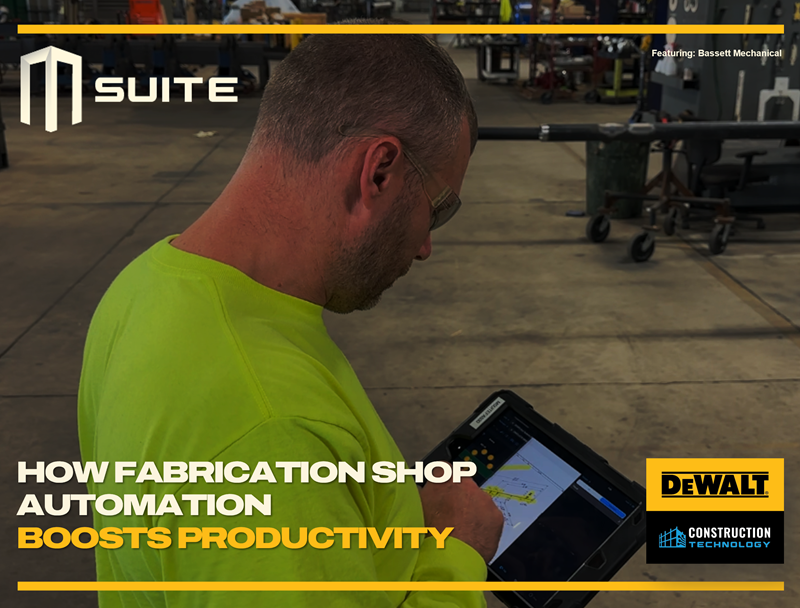Why Fabrication Shop Automation Matters for MEP and Sheet Metal Contractors.
MEP and Sheet Metal contractors and fabrication executives are navigating tightening schedules, skilled labor shortages, and rising material costs. For them, fabrication shop automation is a competitive advantage that can no longer be delayed.
By implementing digital workflows, trade contractors can model their operations after advanced manufacturing standards, leaving behind manual inefficiencies. Automation connects design and production. It reduces human error, removes handoffs, and helps projects stay on time and within budget.
The Core Benefits of Fabrication Shop Automation
Implementing automation across your fabrication shop unlocks clear value for MEP teams:
1. Streamlined, Error-Free Workflows
Manual processes—such as printing, scanning, and converting files—create costly bottlenecks. Automation tools like MSUITE automate BIM-to-fabrication workflows, generating machine-ready files in minutes rather than hours.
2. Higher Throughput & Productivity
Automated spool creation, digital routing, and CNC integrations enable teams to produce more while minimizing manual overhead.
3. Reduced Rework & Miscommunication
Every manual handoff is a risk. Direct, digital data transfers from BIM to equipment reduce misinterpretation and rework.
4. Enhanced Use of Skilled Labor
Automation doesn’t replace workers—it rescues them from repetitive tasks, freeing trade professionals to focus on precise, skilled work.
5. Real-Time Visibility & Decision-Making
Dashboards powered by automation provide management with instant insight into production status, enabling proactive planning and the resolution of bottlenecks.
Where Automation Fits in a Modern Fabrication Shop
Automation doesn’t upend roles—it amplifies them. In a digitally optimized workshop, the key automation zones include:
- Model-to-Machine Integration: Direct transfers from BIM to CNC cutters, benders, and welders.
- Workflow Automation: Automatic routing of jobs, documentation, and machine files.
- Dynamic Shop Scheduling: Automated reprioritization based on project urgency and capacity.
- Quality Control Automation: Digital checklists and inspections tied to production workflows.
- Reporting & Analytics: Real-time dashboards for throughput, resource utilization, and project progress.
These interconnected systems eliminate waste, boost efficiency, and support confident, data-driven leadership.
Best Practices for Adopting Fabrication Shop Automation
Getting started with automation? These five tactics will guide implementation for MEP contractors:
- Start small – Begin with one process whether it’s spooling, machine integration, or throughput tracking, and work your way into the full solution rather than trying to take it all on at once.
- Start with high-ROI areas first. Focus on spool sheet generation, machine file exports, or CNC integration. Quick wins in these areas will build momentum.
- Standardize Across Projects – Consistent templates and workflows ensure that automation works predictably across jobs.
- Train and Engage the Team – To make adoption successful, train both VDC managers and shop crews. Show them how automation can make their work faster and easier.
- Connect Office, Shop, and Field – MSUITE brings together BIM, fabrication, and installation teams into one workflow. This creates a single source of truth.
- Track Metrics, Continually Optimize – Track spool turnaround time, rework rates, and throughput to identify further opportunities for automation gains.
Case Example: Bassett Mechanical Powers the Future of Fabrication
Bassett Mechanical—pioneers in industrial refrigeration, HVAC, plumbing, and metal fabrication—transformed their fabrication process with MSUITE’s advanced FAB and BIM software.
Key outcomes:
- Accelerated spool and sheet generation
- Eliminated manual print-and-scan steps
- Enabled real-time traceability for welders and heat numbers
- Improved visibility for both shop floor and field operations
This case shows how automation improves efficiency. It also helps teams create high-quality work faster and more consistently. Read the full case study here: Bassett Mechanical Powers the Future of Fabrication.
The Role of MSUITE in Your Automation Strategy
MSUITE is designed to unify BIM, fabrication, and field workflows—making automation achievable and actionable. Features include:
- Automated spool and machine file generation
- Direct equipment integrations
- Real-time dashboards for leadership
- Standardized workflows across projects
- Seamless communication between the office, shop, and field
With MSUITE, MEP contractors leave outdated, manual methods behind—and step into a connected, confident future.
Looking Ahead: Where to Learn More
Fabrication shop automation is reshaping the MEP industry. Contractors that embrace connected workflows and real-time visibility are the ones winning bids, margins, and repeat business.
Frequently Asked Questions About Fabrication Shop Automation
What is fabrication shop automation?
- A digital system simplifies fabrication workflows. It goes from BIM data to machine-ready files. This process removes manual steps and increases accuracy.
How does automation help MEP contractors?
- It accelerates production, reduces rework, liberates skilled labor, enhances visibility, and minimizes project delays through precise digital workflows.
Which areas of the shop are best suited for automation?
- Spool generation, CNC integration, scheduling, quality control, documentation, and real-time tracking are top candidates.
Does automation replace skilled workers?
- Not at all. It frees them from repetitive tasks, letting them focus on craftwork, while digital systems handle the busywork.
What ROI can contractors expect?
- Many companies say they generate spools 30–40% faster. They also see less rework and more output. All these factors help save money.
How does MSUITE support automation?
- MSUITE combines BIM, fabrication, and field teams into one platform. This allows for automated spool preparation, machine integration, dashboards, and standard workflows.
Conclusion
Fabrication shop automation is more than a technology shift—it’s a business transformation. For MEP contractors, it means faster delivery, fewer errors, and smarter use of labor in an industry where every hour and dollar counts. By standardizing workflows and connecting BIM to the shop and field, automation creates a competitive advantage that drives both productivity and profitability.
MSUITE is purpose-built to help contractors lead this transformation. From spool automation to real-time dashboards and seamless shop-to-field connections, MSUITE gives executives, project managers, and shop teams the tools they need to perform at their best.
Now is the time to future-proof your fabrication shop. Those who adopt automation today will set the standard for tomorrow.
Ready to see what automation can do for your shop? Request a demo with MSUITE









